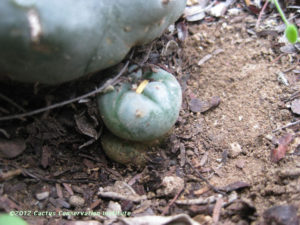This is the earliest mention of peyote use that we have found appearing in the English language (a couple of centuries after the Spanish accounts).
From the The Times Picayune (New Orleans, LA), 1857, 30 September, page 1.
Letter from “The Colonel”
—-
Whiskey Root—-Southern Product—-Drying Whiskey—-A Dram’s a Drachm — A “Buckload” and “A Passel of Whiskey”—-Dealers and Consumers—-One of the Benefits of the Kansas and Nebraska Bill.
—-
[Correspondence of the Picayune.]Rancho, Near Corpus Christi, Texas,
September 19, 1857.
My Dear Pic.— Some time ago I wrote you that where was such a thing in this country as a “whiskey root;” you disbelieved; I now take my revenge by sending you the specimen. It is what the Indians call “Pie-o ke.” (as near as I can spell the pronunciation). It grows in Southern Texas on the range of sand hills bordering on the Rio Grande river, and in gravel, sandy soil. The Indians eat it for its exhilarating effect on the system, producing precisely the same as alcoholic drinks. It is sliced as you would a cucumber, and these small pieces chewed, the juice swallowed, and in about the same time as comfortably tight cock tails would “stir the divinity” within you, this indicates itself; only its effects are what I might term a little more k-a v o r-t i n-g, giving rather a wilder scope to the imaginations and actions. It can be sliced and dried, and in this way the Indians preserve it, then parch and serve it up as coffee or tea. It is evidently of cactus species, and it resembles that more than any other plant. I have never seen this particular root mentioned in any work, and believe these—and specimens I sent to the editor of the Southern Cultivator—to be the first specimens sent from the State. I wish you would have these analyzed, and publish the result. I would do this myself but for two reasons—1st, I have no crucibles, chemicals tests, or conveniences for accurately making the analysis; and 2d, even if I had, I don’t know how to do it. If, therefore, under these disadvantageous circumstances, I were to make the experiment, the result could not be relied upon as a chemical certainty.
This plant is suggestive of much reflection to the Southern man; it is a Southern product, and as such I am disposed to patronize it.
From its growing only among the rocky hills, its life is a hard one, and as such, I’m disposed to sympathize with it.
It being of home manufacture, we can supply ourselves cheaper than sending to the North, or elsewhere.
And just think of the advantage of a fellow hanging out his whiskey to dry!—a most decided improvement.
Think of the convenience of calling for a bushel of whiskey! for it’s a going to knock wet measure into dry, thus—say a bushel is 56 pounds, 16 ounces in a pound, and 16 drachms in an ounce. This would give 15,333 drachms to the bushel; or a bushel would give one man 15,333 drams, or give 15,333 men one dram each. And you can thus conveniently calculate from a single private individual up to a whole family, or to a—“general muster.”
It is going to benefit the dealer; for it settles definitely the question—what a dram is. But now, some men say — “just pour me out very little;” another will say — “give me a Buck Load” — which means five fingers on a tumbler — as that is the measure on his ramrod for a “buck load;” and yet will say — “I’ll take a passel of whiskey.” Under this new “Southern Institute,” a dram’s a drachma; and if one dram is not sufficient to line all the coats of his stomach, he can just say — “duplicate,” or — “cut me off another peck,” or “half bushel,” according to the size of the stomach.
It will be a great convenience to the consumer; for he can send a wallet and a tape string measure of how much he belts around the stomach, and the dealer consults his “table of measures.” and fills the order. Suppose for instance, a party of three gentlemen wish to go fishing, and want whiskey; their order would read thus:
“Mr. Whiskey-Straight”
“Sir—-Please send whiskey for party; two days; 3 men; measuring 36, 47, and 83 —tight. Yours, in spirit and in truth.
“Rum One.”
“N.B. See it well tied up in the bag, and don’t throw it loose on Jo’s saddle, as he is apt to drop some on the road.”
The discovery of this valuable product, totally refutes the Northern fanatics’ assertion that “the South cannot subsist without the North.” It never grew, in luxuriance, until after the passage of the Kansas and Nebraska bill—which leaves to the people the right to form their domestic institutions in their own way.
But I send it to you as a botanical novelty, and shall remain in a state of excitement—I have some of it dried—until I hear the result of the chemical analysis. Your, &c,
The Colonel


